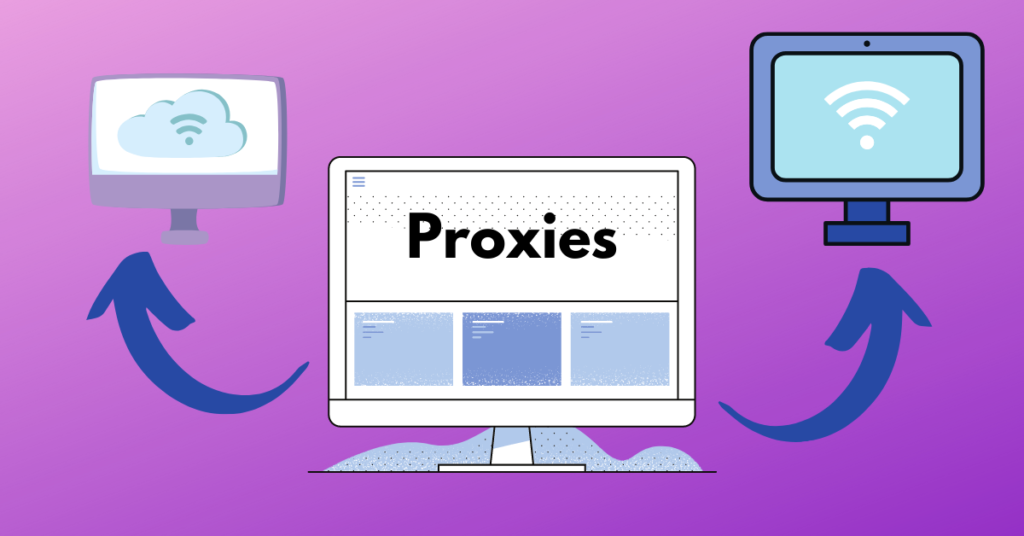The benefits of proxy servers to companies are much more than what you can get as an individual. In your home, you might use a proxy server to unlock geo-restricted content on, say, Netflix or HBO. But if you happen to run an online business that requires web scraping, then more benefits abound. The advantages are even much more if you run a large company.
A proxy server reroutes or redirects all web requests from internet-connected devices assigning each device a new IP address. An IP address is a computer’s unique identifier as it traverses websites. As such, a new – assigned – IP address adds a layer of privacy, security, and anonymity.
Regardless of the type of proxy server, you opt for, be it a residential proxy like Geonode, datacenter proxy, high anonymity proxy, mobile proxy, etc. you are bound to choose among three options. These options are: free, shared, or dedicated proxies. From the onset, free proxy servers are pretty unreliable. As such, this brings us to a duel: dedicated IP vs shared IP.
Dedicated Proxies vs. Shared Proxies
A dedicated proxy server is also known as a private proxy. It’s the best option of the three, and as the saying goes, the best is saved for last. To this end, a look at shared proxies reveals intriguing information that should guide your decision-making process, especially if you’re running a company.
Why are shared proxies unreliable?
Shared proxies operate on the principle of sharing IP addresses among many users. In essence, if you opt to use a shared proxy, you’re simply sharing a single server with multiple other people who, in total, could be in their thousands. By sharing a server, you’ll end up also sharing the assigned bandwidth, which reduces the connection speed.
As if that’s not enough, you’re also likely to end up dealing with a lot of CAPTCHA alerts because many people may be accessing the same site simultaneously. The site, say, Google, will end up noting this anomaly and flag your shared IP address leading to the CAPTCHA alerts.
Furthermore, the fact that the server and, by extension, the IP address, is shared means that reliability is thrown out the window. Given that plenty of users exist per IP address, a person’s – just a single individual – activity could cause the shared IP address to be blacklisted. The result is that you’ll be left high and dry, particularly if the shared proxy provider doesn’t offer a resolution fast.
On the positive side, though, shared proxies are affordable, and they offer more security because they make it hard for systems to track a single individual from the pool of thousands of users. Other than that, they aren’t worth it for companies.
Because even with the issue of added security, some of the people with whom you share an IP address could be hackers. By using unverified service providers, you’re likely to fall victim to cybercrime. Similarly, why would a company engaging in legitimate business need added anonymity? This would only benefit an individual user.
The slow speeds, unreliability, and propensity for blacklisting lead us to dedicated proxies as the solution for large businesses.
Why should companies choose dedicated proxies (IP)?
Dedicated/private proxies assign every user a unique IP address. Technically, with a private proxy server, you’re simply using a single server. This translates to more bandwidth per user and, consequently, more speed. In this regard, with private proxies, you won’t have to deal with slow speed, as would have been the case with shared proxies.
Secondly, having a unique IP address per user, that translates to more security and added anonymity. Fundamentally, unlike with shared proxies, you or the company won’t share your IP address with other users who could be hackers or spammers. As such, you don’t have to worry constantly about your company’s computers getting hacked or your browser being hijacked for illegal practices.
Thirdly, dedicated proxies are reliable since the providers carry out maintenance and service upgrades frequently. After all, they charge a premium and can afford such measures regularly. Additionally, dedicated proxy providers provide user authentication features, thereby ensuring that only authorized personnel gets to use the service.
Lastly, dedicated proxies don’t feature ads that throttle internet speeds and disrupt work. On this front, they’re better than shared or free proxies, which include ads to recoup their investments on the infrastructure deployed.
Some dedicated proxy server providers provide additional features, e.g., filtering malicious websites and controlling internet usage among employees – this prevents them from accessing unsecured websites. However, all these benefits come at a premium, but that’s a small price to pay.
The dedicated IP vs shared IP debate ends in favor of the former, particularly for businesses and companies. This article has provided an overview of why companies shouldn’t consider shared proxy servers. Instead, go for dedicated proxy servers.
Is a freelance tech writer based in the East Continent, is quite fascinated by modern-day gadgets, smartphones, and all the hype and buzz about modern technology on the Internet. Besides this a part-time photographer and love to travel and explore. Follow me on. Twitter, Facebook Or Simply Contact Here. Or Email: [email protected]


![Get 100% Working Free Netflix Cookies All Hourly Updated [Today's Cookies] Netflix Cookies Free Download](https://axeetech.com/wp-content/uploads/2020/08/Netflix-Cookies-Free-Download.jpg)


![HBO Max Apk for Android 2020. [Download Outside USA] HBO Max Apk Download](https://axeetech.com/wp-content/uploads/2020/05/HBO-Max-Apk-Download-Android-scaled.jpg)
![How to Fix Not in Service Area Error in HBO Max. [2020] NOt in Service Area ERROR HBO max Fix](https://axeetech.com/wp-content/uploads/2020/05/HBO-Max-Not-in-service-Area-Error-Fix.jpg)

Leave a Reply